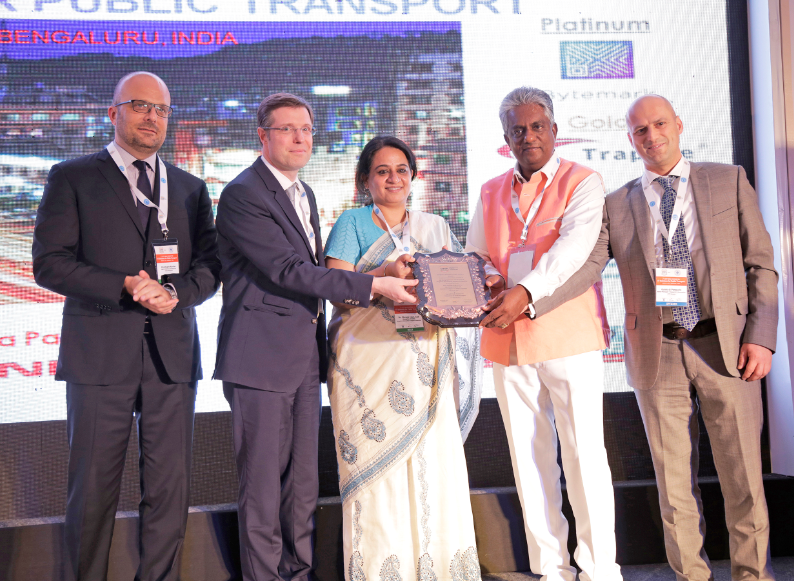By R. Natarajan, Managing Editor & Publisher
The 2nd UITP India Seminar on IT Solutions for Public Transport held recently in Bangalore reflected the huge potential available to develop advanced ITS technology for improving the country’s public transportation system. Ably organized by UITP India under the leadership of Dr. Ekroop Caur, Managing Director, Bangalore Metropolitan Transport Corporation, and Head, UITP India Board, the Seminar was hosted by Bangalore Metropolitan Transport Corporation (BMTC) and attracted luminaries from the transport sector across the globe.
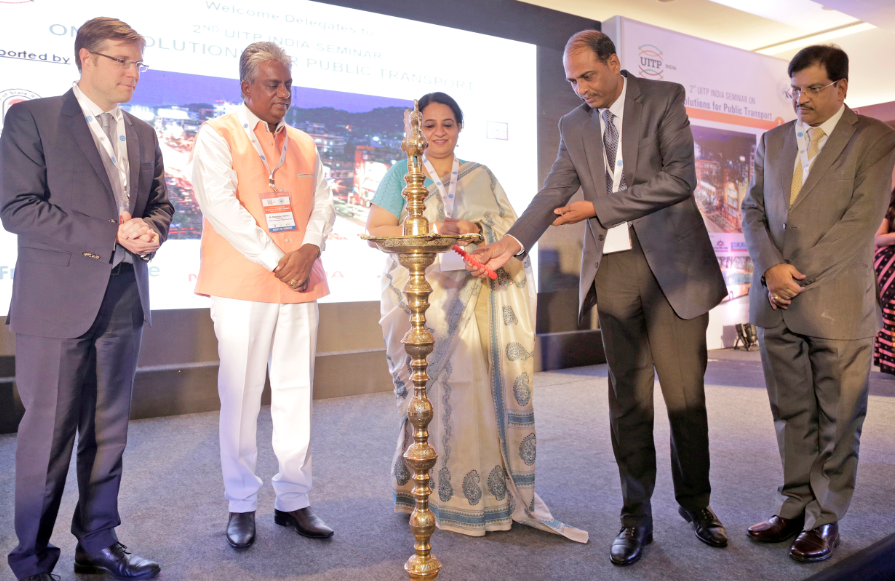
In his opening remarks, Mr. Jerome Pourbaix, Director of Regions, UITP Brussels, said Bangalore is one of the most dynamic cities in the world which is why UITP decided to set up its Indian operations 10 years back in the Silicon Valley of India. Since the population in India is growing very fast, there is great potential for increase in public transportation system. There are three major trends which can drive transport systems in India, namely, use of ITS in public transport, funding of transport systems through various methods and focus on urbanization.
In her welcome address, Dr. Ekroop Caur said after the success of first UITP India seminar on IT solutions a year ago, they were hosting the second such event in Bangalore. Today, ITS has become a buzzword with number of solutions offered including automatic signaling, channelizing traffic, counting ticket fares, etc., and is spreading into several new areas. IT solutions also offer number of benefits to optimize the operations of transport companies. BMTC, with a fleet strength of around 6,500 buses, has become a trendsetter in offering right solutions with GPS, sign boards for departure and arrival, mobile apps, which will help to find the bus routes, etc. The corporation is currently moving 5 million passengers in and around Bangalore every day and a key reason for its success are its efficient and reliable IT solutions. The population in Bangalore during the last decade has more than doubled and since two-wheelers are not too safe, the public transportation system has not only become safer but reliable too. Today BMTC offers technology which suits the passenger’s requirement.
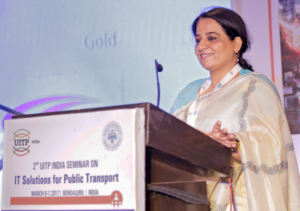
Referring to UITP’s activities in India, Dr. Caur said it conducts a number of seminars related to the bus sector apart from the one on IT solutions and also offers training on putting data to good use. Shortly, UITP is planning to have a training course for electric buses and a seminar on automated fare collection system. Due to increasing competition from the private sector, the public sector undertakings are looking at outsourcing some of its services.
In his special address, Mr. S.R. Umashankar, Vice President, ASRTU, and Managing Director, KSRTC, said public transportation is facing lots of challenges in administration, operational efficiency, handling the data management, and that ITS can play a major role in providing the right solution.
Mr. Lewis M. Fulton, Director, Sustainable Transportation Energy Pathways (STEPS) Program, Institute of Transportation Studies, University of California, made a presentation on the “Changing the Path to a sustainable mobility future”. To revolutionize transportation worldwide, there are three major factors which can play a major role. These include: 1) Vehicle electrification, 2) IT solutions and 3) Introduction of autonomous vehicles. Currently, India has the vehicle population of 20 million as compared to 200 million in China and hence has vast scope to increase the vehicle population. According to various studies, India can save energy by using more and more public transportation system with alternative fuel technology.
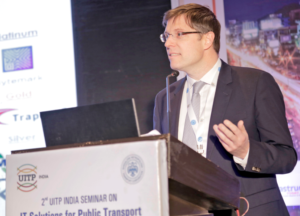
Mr. Ashwin Mahesh, Co-founder, Mapunity / Lithum, made a presentation on “Technology in Urban Mobility: Practical Interventions in the Indian Context”. According to him, every corporation should first focus on governance and then on intelligence, technology, etc. Also, they should try to build internal capacity instead of outsourcing.
Mr. Ravi Gadepalli, Program Manager, Transport, Shakti Sustainable Energy Foundation, delivered his speech on “ITS in Indian Bus System – Current Scenario and Way Forward”. According to him, there is a shortfall of two lakh buses in public bus fleet and the services are not in line with changing times. Hence, he says there is a need for better bus systems with 40 per cent of the population here depending on it.
While speaking on “Why Public Transport and Bus Priority in Singapore”, Mr. Mohd Farhan Sukri, Senior Engineer, LTA Singapore, said 56 per cent of daily trips in Singapore are done by buses and the country has dedicated bus lanes, B-signal, mandatory lanes for buses, etc. Mr. Guido Di Pasquale, Senior Manager, Research & Innovation, UITP Brussels, spoke on “Value of Interoperability”.
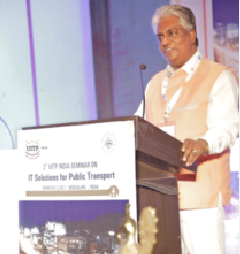
Briefing about his company, Mr. Tushar S. Kshirsagar, Head – Information Technology, Prasanna Purple Mobility Solutions Pvt. Ltd., said with 1,200 buses and 6,500 employees, Purple is transporting 4 million passengers every day. This has become possible only with the implementation of efficient transport management solutions. Mr. R. Srinivasan, President, India Business Region, Watchdata Technologies (India) Pvt. Ltd., spoke about the increasing demand for SIM cards for various applications including in the transportation sector. Mr. M. Ramsekhar, Chief Executive Officer, DIMTS Ltd., spoke about the success story of Delhi Metro which has substantially reduced the traffic movement in the NCR region. Mr. Nagendra, Chief System Manager, BMTC, explained about the Corporation’s strength and its focus on ITS.
Mr. Martin Hamilton, Managing Director, APAC, Bytemark Inc., shared his views on “Mobile Ticketing, Real Time Data: Improving Operational Efficiency”. As a leading player in the field, the company has won Juniper Award last year for providing efficient ticketing system. Mr. Mel Pecen, Managing Director ANZ, Trapeze Group, made his presentation on “Business Insight for Bus Operations : Building True Business Intelligence to achieve Commercial Success”. Since bus business is becoming increasingly competitive there is a need to have special focus on various innovative technologies.
The last session of the UITP seminar witnessed interesting presentations by experts. While Mr. Matt George, CEO, Bridj, briefed about “Innovative Mobility”, Mr. Anup Sable, CTO, KPIT Technologies Ltd., spoke on “Going Beyond, Traditional Data for Integrated Transportation in Smart Cities”, Mr. Arvind Singhatiya, Vice President – Corporate Affairs, ANI Technologies Pvt. Ltd., shared the success story of Ola in India. Mr. Christian Freese, General Manager – Bangalore and South Expansion, Uber, highlighted his company’s contribution to public transportation system in India and the efficient role played by Uber. Recently, Uber has also widened its services through 12-seater mini buses in selective areas like Gurgaon and Faridabad in Northern Region which have been very successful.
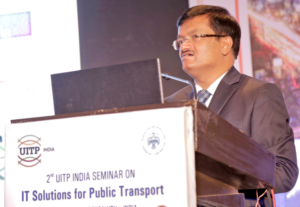
BMTC – a role model
Mr. M. Nagaraju (Yadav), Chairman, BMTC, energized the audience with his overwhelming speech and complimented Dr. Ekroop Caur, for her dynamic and proactive approach in managing BMTC as well as UITP activities.
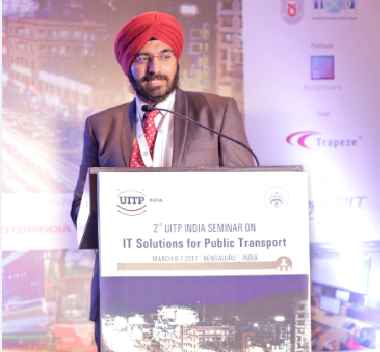
Mr. Nagaraju, while highlighting the success story of BMTC said, his corporation is one of the best in the country and in order to provide high quality services to its passengers, it maintains a good fleet of buses. Shortly, the corporation will replace its old buses with new ones, with an order for 250 Volvo buses placed recently to add to the 750 Volvos already in its fleet. BMTC was also ready to take up competition from private operators at a viable cost. It also believes in adopting better technology towards safety and environmental concerns. The corporation will also continue to focus on safety of children, women, for which major steps have been taken by them. In order to bring in more innovations, Mr. Nagaraju sought the help of youngsters, institutes and travel operators. “Our ultimate aim is to make the beautiful world as green world”, he added.
Mr. Jaspal Singh, Head of UITP India Office, thanked all the speakers and delegates who had traveled from different parts of the world as well as the sponsors for their generous contribution towards making the event a grand success.
India needs one million more buses
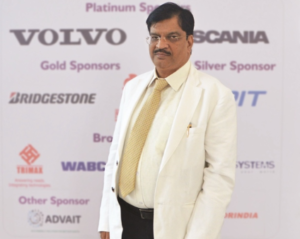
Mr. P.S. Ananda Rao, Executive Director, Association of State Road Transport Undertakings (ASRTU), in his thought-provoking address, spoke on ‘Transportation Initiatives and the Services’ offered by ASRTU which is the apex body for the State Transport Undertakings in the country. ASRTU was established in 1965, to redefine the transportation system in India with 70 members, has a fleet strength of 1,50,000 buses. ASTRU through its member corporations move 70 million passengers every day covering 41.35 million km per day. It also connects 1,73,000 villages through its efficient network of road transportation. It is the largest rate contract body for transportation industry across the country and emerged as a knowledge hub for its members by offering various innovative technology and services.
While referring to the current scenario, Mr. Ananda Rao said with a population of over 1.25 billion, India requires 1.6 million registered buses. Today, the number of buses plying on the road both private and public is 16,50,000 of which 1,50,000 buses operated by PSUs and the balance 15,00,000 vehicles by private sector bus operators. The number of buses ratio in India is 1.5 for 1,000 population. Also, the number of buses with ITS technology is a mere 1 per cent and the cost of operation, maintenance and manpower accounts for 80 per cent. On the other hand, the share of road in passenger traffic has increased from 32 per cent in 1951 to 90 per cent in 2012-13, mostly by private vehicles.
Referring to the future scenario, Mr. Rao pointed out that with more urbanization taking place, there is an immediate need to induct one million buses in order to increase the bus ratio for every 1,000 people. This will improve the connectivity to all villages as well as improve the efficiency with ITS technology.
Mr. Rao also complimented his members including BMTC, KSRTC for doing an excellent job in intelligent transport management system. ASRTU has launched several new initiatives including ITS projects in order to provide big data capacity building, standardization, etc. The corporation has also established a skill development centre for driver training particularly for electric and hybrid buses.
